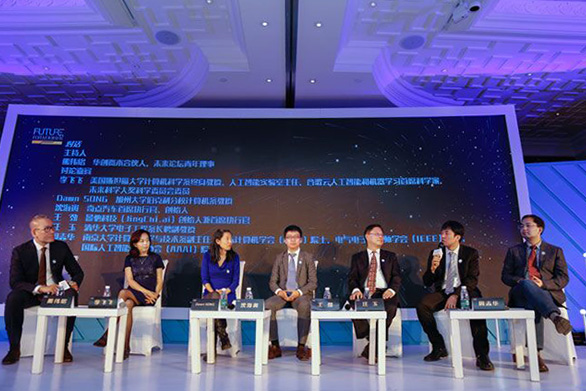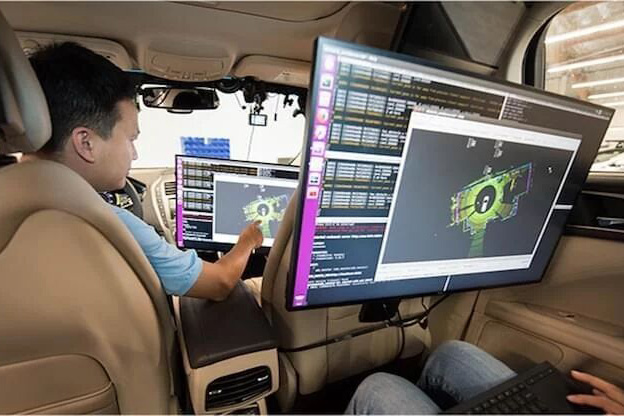


Experts discuss at a panel discussion at the Future Forum on Oct.29 in Beijing. (Photo courtesy of Future Forum)
After 60 years of development, the rapidly advancing AI industry has yet to usher in a modern age the way Isaac Newton did with physics, but this provides a good opportunity for countries like China to turn the tide.
Addressing a panel discussion on Oct.29 at the Future Forum in Beijing, Wang Jin, founder of JingChi Corp, a self-driving technology company based in the US state of California, said he believes the global car industry now faces a chance to breakthrough, as competition heats up among several major players, namely the US, China, Germany, and Japan.
China has poured huge investment into technology research and development. The time has come for China to join the competition over the leading role in the century-old automobile industry with its advantages in technology, noted Wang, who is also a former senior vice president of Baidu.
Figures released at the forum show that China is taking over the US in the number of thesis papers published on AI. Some 43 percent are written by Chinese scholars.

Engineers test in a self-driving car at Jingchi Corp (Photo courtesy of Jinchi Corp)
China’s outstanding performance on AI studies is not only demonstrated through the number of theses, but through many champion titles in international challenges.
On Oct.29, a Chinese AI company for the first time claimed the top of the world’s computer vision competition of Microsoft Common Objects in Context (MS COCO) Challenge in Venice, Italy. The company, Megvii, beat Microsoft, Google, Facebook, and other global tech giants, as well as many top universities including Carnegie Mellon University.
After its sweeping victory in the world’s only competition that gathers Google, Microsoft, and Facebook at the same time, Megvii announced on Oct.31 that it has completed a C-round financing of some $460 million, a world record in AI financing, Caijing Magazine reported.
Meanwhile, experts at the forum pointed out that the world is craving for more AI talents, and China is one of the most eager ones.
According to leading AI expert Li Feifei from Stanford University, the demands for AI talents across the globe greatly exceed the supply. The imbalance exists not only in academia, but also in business, requiring more AI education and research.
“The situation is worse in China, as it only started to getting its hands on AI about 10 years ago, hence the inadequate talent pools,” Zhou Zhihua, vice dean of the Department of Computer Science and Technology at Nanjing University told the panel, adding that few companies seeking AI talents are willing to help with AI education, and are looking for talents from other companies and research institutes.
Wang agreed that the scarcity of AI talents in China is greater than that in the US, taking the example of salary for AI-related employees. One tends to see up to 15 percent salary raise in China when transferred from the US, but it would be a decrease if one transferred from China to the US.
Professor Dawn Song from the Department of Electrical Engineering and Computer Science at the University of California, Berkeley, said that the focus should be on fundamental research, even though companies want fast solutions rather than long-term cultivation, because this can beef up their problem-solving abilities when needed.
 Fire brigade in Shanghai holds group wedding
Fire brigade in Shanghai holds group wedding Tourists enjoy ice sculptures in Datan Town, north China
Tourists enjoy ice sculptures in Datan Town, north China Sunset scenery of Dayan Pagoda in Xi'an
Sunset scenery of Dayan Pagoda in Xi'an Tourists have fun at scenic spot in Nanlong Town, NW China
Tourists have fun at scenic spot in Nanlong Town, NW China Harbin attracts tourists by making best use of ice in winter
Harbin attracts tourists by making best use of ice in winter In pics: FIS Alpine Ski Women's World Cup Slalom
In pics: FIS Alpine Ski Women's World Cup Slalom Black-necked cranes rest at reservoir in Lhunzhub County, Lhasa
Black-necked cranes rest at reservoir in Lhunzhub County, Lhasa China's FAST telescope will be available to foreign scientists in April
China's FAST telescope will be available to foreign scientists in April "She power" plays indispensable role in poverty alleviation
"She power" plays indispensable role in poverty alleviation Top 10 world news events of People's Daily in 2020
Top 10 world news events of People's Daily in 2020 Top 10 China news events of People's Daily in 2020
Top 10 China news events of People's Daily in 2020 Top 10 media buzzwords of 2020
Top 10 media buzzwords of 2020 Year-ender:10 major tourism stories of 2020
Year-ender:10 major tourism stories of 2020 No interference in Venezuelan issues
No interference in Venezuelan issues
 Biz prepares for trade spat
Biz prepares for trade spat
 Broadcasting Continent
Broadcasting Continent Australia wins Chinese CEOs as US loses
Australia wins Chinese CEOs as US loses